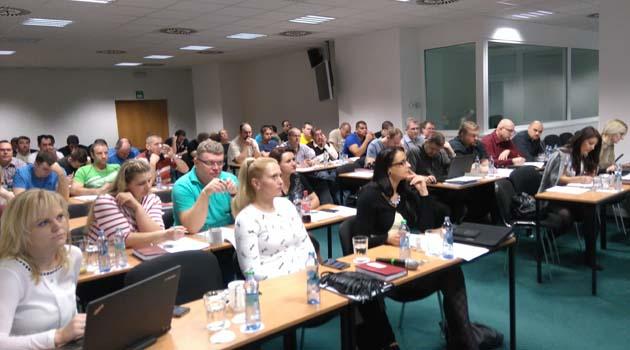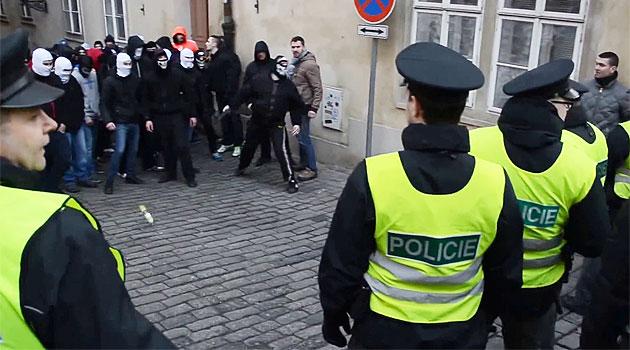Czech Republic: ROMEA trains police on working in excluded localities

From 8 – 10 February 2016, yet another set of lectures was held in Beroun, Czech Republic to prepare 60 police officers from four different regions with higher numbers of socially excluded localities in how to work with members of the Romani minority. The aim of the pilot education project is to introduce officers from district departments into the field who have knowledge of the Romani environment so they will be able to establish mutually beneficial communication with them.
The seminar is part of a series in which officers familiarize themselves with non-governmental, non-profit organizations in the Czech Republic and their programs and
projects, with the option of establishing contact with them in the future. Jan Černý of the People in Need organization gave a talk about overindebtedness and social
services for socially endangered places, while representatives of the DROM organization in Brno and Life Together (Vzájemné soužití) in Ostrava reported on the
activities of nonprofit organizations in socially excluded localities in those cities.
The ROMEA organization also contributed to the program – lecturers Renata Berkyová and Karolína Ryvolová opened the lectures by explaining the subdivisions of ethnic
groups of Roma in the Czech Republic and explaining which surnames are typical of which group. For their part the officers demonstrated their knowledge of the
environments they work in daily and had no difficulty being assigned to them.
Knowledge of the Romani environment is key
The ROMEA lecturers familiarized the officers in detail with the concepts of romipen, paťiv and ladž, i.e., the concept of ritual purity which, frequently
unconsciously, can negatively influence the establishment of this communication and how it proceeds. For example, officers may not recognize the rules of social hierarchy
that a particular community follows.
A video was shown on the specifics of the Romani ethnolect of Czech and its meaning for the Romani community – officers were able to verify in practice the linguistic
rules discussed and how they might turn up in a communication situation. A police officer working at the Janov housing estate confirmed that other officers say the
Romani ethnolect makes it difficult for police to correctly comprehend situations there: "I have never fully understood what those guys were trying to say. Now it’s
clear to me that misunderstandings can arise, for example, if they use the wrong preposition when they decline a word. Romani speakers, however, are not aware of these
grammatical errors because no one has ever pointed them out to them. Until now, no one has ever explained to me how different the grammatical rules of Czech and Romani
are and how that can result in a change to the meaning of what is said."
In conclusion, the lecturers and officers jointly created a list of the professionally successful Romani people whom they know from their surroundings. The names of
some of the Romani police colleagues attending the seminar were mentioned.
These officers frequently confirmed the lecturers’ interpretations and contributed their own personal experiences. "It was apparent from their interactions that all of the
officers there are able to rely on each other, and that the non-Romani officers appreciate their Romani colleagues. That may be caused by the fact that based on their
own experiences, the officers know very well what it takes to face down the prejudices of society," Berkyová said.
The lecturers said those attending took an active interest in the topics being approached, responded spontaneously, and unequivocally demonstrated that they have
insight into the issue and mainly, that they are interested in it: "Several times we were pleasantly surprised that there were fitting questions posed that indicated
the officers know exactly what kinds of communication situations can arise and that they want advice about how to proceed with resolving them in practice. From their
remarks it was evident that they are aware of the broader context they are operating in," said Ryvolová.
Officers getting experience abroad as well
Special officers for working with minorities are used, for example, by the police in Slovakia, and Britain also has a wealth of experience with community policing. One
of the partners of the project is the Cambridgeshire County Police, so part of the Czech specialists’ preparations last year involved a visit there.
In addition to sharing their experiences, the British Police also provided their Czech colleagues with methodological materials to use when introducing the position of
special officers in the Czech Republic. The pilot project, entitled "Introducing police specialists for working with the Romani minority in socially excluded localities", has a budget of CZK 16.5 million (EUR 610 000), is 80 % financed from the Norway Grants.
The project began last fall and will end in April. Those being trained are liaison officers and police specialists from the Karlovy Vary, Moravian-Silesian, Olomouc
and Ústí Regions who are supposed to become intermediaries between Romani people and the police, or rather, the majority society.
"After completing the project there will be a five year period during which its sustainability must be guaranteed. That means the trained officers must work according
to the established parameters. However, we presume that even after that period the job of specialist will not end – on the contrary, on the basis of our experience
from the pilot project, we believe specialists will be introduced into the police as a whole, into all of the rest of the regions," said Václav Vlček of the
Public Order Police Directorate.
